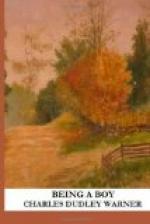If you had seen John, in his short and roomy trousers and ill-used straw hat, picking his barefooted way over the rocks along the river-bank of a cool morning to see if an eel had “got on,” you would not have fancied that he lived in an ideal world. Nor did he consciously. So far as he knew, he had no more sentiment than a jack-knife. Although he loved Cynthia Rudd devotedly, and blushed scarlet one day when his cousin found a lock of Cynthia’s flaming hair in the box where John kept his fishhooks, spruce gum, flag-root, tickets of standing at the head, gimlet, billets-doux in blue ink, a vile liquid in a bottle to make fish bite, and other precious possessions, yet Cynthia’s society had no attractions for him comparable to a day’s trout-fishing. She was, after all, only a single and a very undefined item in his general ideal world, and there was no harm in letting his imagination play about her illumined head. Since Cynthia had “got religion” and John had got nothing, his love was tempered with a little awe and a feeling of distance. He was not fickle, and yet I cannot say that he was not ready to construct a new romance, in which Cynthia should be eliminated. Nothing was easier. Perhaps it was a luxurious traveling carriage, drawn by two splendid horses in plated harness, driven along the sandy road. There were a gentleman and a young lad on the front seat, and on the back seat a handsome pale lady with a little girl beside her. Behind, on the rack with the trunk, was a colored boy, an imp out of a story-book. John was told that the black boy was a slave, and that the carriage was from Baltimore. Here was a chance for a romance. Slavery, beauty, wealth, haughtiness, especially on the part of the slender boy on the front seat,—here was an opening into a vast realm. The high-stepping horses and the shining harness were enough to excite John’s admiration, but these were nothing to the little girl. His eyes had never before fallen upon that kind of girl; he had hardly imagined that such a lovely creature could exist. Was it the soft and dainty toilet, was it the brown curls, or the large laughing eyes, or the delicate, finely cut features, or the charming little figure of this fairy-like person? Was this expression on her mobile face merely that of amusement at seeing a country-boy? Then John hated her. On the contrary, did she see in him what John felt himself to be? Then he would go the world over to serve her. In a moment he was self-conscious. His trousers seemed to creep higher up his legs, and he could feel his very ankles blush. He hoped that she had not seen the other side of him, for, in fact, the patches were not of the exact shade of the rest of the cloth. The vision flashed by him in a moment, but it left him with a resentful feeling. Perhaps that proud little girl would be sorry some day, when he had become a general, or written a book, or kept a store, to see him go away and marry another. He almost made




